
MOTOR
CITY GARAGE BANDS CD-THE UNRELATED SEGMENTS, TIDAL WAVES, LYKES OF US, COURIERS, DISTRICT SIX, 26 TRACKS- ORDER THIS CD FOR ONLY $12.98
Long recognized as two of the best garage bands from Michigan, The Unrelated Segments whose “The Story Of My Life” has appeared on Rhino’s Nuggets box set and The Tidal Waves who scored a number one hit with “Farmer John” are the main focus of this compilation of Detroit garage bands. All of The Unrelated Segments and The Tidal Waves material are included on this CD, in the finest sound yet. The other Detroit area bands, while nearly forgotten today, released a fine batch of recordings, the best of which are represented on this compilation. Inside this package is over 75 minutes of electrifying music and a 16 page booklet with numerous band photos, radio surveys, concert posters, tape recording sessions, and detailed liner notes and discographies for each band. All tracks from the original master tapes. TRACK LISTING The Boys 1. How Do You Do With Me The Quintette Plus 2. Grits and Grease The Unknowns 3. Night Walkin’ The Tidal Waves 4. Farmer John 5. She Left Me All Alone 6. I Don’t Need Love 7. Big Boy Pete 8. Action (Speaks Louder Than Words) 9. She’s My Woman The District Six 10. 7 And 7 Is 11. East Side Story The Couriers 12. I Couldn’t Care Less 13. Just Tell Me The District Six 14.Remember The Lykes Of Us 15. 7:30 Said 16. Tell Me Why Your Light Shines The Unrelated Segments 17. The Story Of My Life 18. Its Not Fair 19. Where You Gonna Go 20. It’s Gonna Rain 21. Cry ,Cry, Cry 22. Hey Love 23. There’s Gonna Be A Change 24. The Story Of My Life (alternate long version) The Lykes Of Us 25. I’ll Sing You A Love Song 26. 7:30 Said(alternate)
In the 60’s, Detroit was a major recording center rivaled only by New York and Los Angeles. Every major record label was recording in Detroit, mainly because of the tremendous success of Motown. United Sound on Second Ave. was the prestigious stand-alone recording studio during those years. Hit recordings such as “Heavy Music” by Bob Seger, “Cool Jerk” by The Capitols, “Just Like Romeo and Juliet” by The Reflections, and “Baby I’m Yours” by Barbara Lewis were all done at United Sound. Local bands such as The Tidal Waves, The Unrelated Segments, The Scott Richard Case and The MC5, among many other Detroit bands also utilized United Sound. After the recordings were put to wax, the key radio station that promoted most of the local bands with prodigious airplay was WKNR. These same bands could also be found performing their songs on a popular teen TV show, Robin Seymour’s “Swingin’ Time”, which was broadcast daily from 5:00-6:00, Monday to Saturday on Channel 9. This first volume of Motor City Garage focuses on the bands who recorded for a independent record label and production company, SVR, and three other groups who recorded on their own.
SVR and Detroit Music
SVR was a small label located in Detroit, owned by John Checkaway. SVR released a worthy number of Soul recordings( by such bands as The Four Gents, the Durettes, and The Perfections), but these tracks are outside the scope of this compilation. One might even argue that the term “Motor City Garage” doesn’t apply to some of the SVR recordings on this disc, such as “I Don‘t Need Love” and “How Do You Do With Me”, but that would be a subtle distinction, as the tenor of the recordings was of the same youthful innocence and aspirations that so many of the one-shot garage bands had in their oeuvre. All were seeking at the very least, fifteen minutes of fame and adulation.
John Checkaway provided a perspective on this issue in the liner notes for the aborted SVR Rock Hits Of The Sixties-Volume II Cd. He stated that “as to the making of SVR recordings, the company worked on these recordings and I chuckle over the current chic category label of “garage band”, which has been applied to SVR recordings. Typically, I would review in depth the live performance of the original songs a particular artist or band had. Then, a producer would be assigned, the principal producer was Richard Cioffari, a long time friend, and a very schooled musician, comfortable in both classical and popular music. One title would then be selected for an A-side and one for a B-side. Then a series of dates were set wherein Cioffari and I would work with the artist and make changes in the arrangement. When the performers finally became comfortable with the changes, a recording session was scheduled. Recording sessions in the sixties were typically one day affairs. At times SVR would take two consecutive days, but in those sessions four or five songs were cut. In the actual sessions, we many times added extra musicians-frankly we paid many of the Motown musicians to moonlight. You can clearly hear them on the instrumentals by The Quintette Plus as well as in the sax performance on “Farmer John.”
SVR did most of their recordings at United Sound. United Sound was located in an old movie theater comprised of several studios. The key players in the make-up of the studio were the engineers, Les Cooley and Bill Beltz, and they had the first Scully four-track recorder in the country. The first pop release by SVR was a single by The Boys “I Wanna Know” b/w “Angel Of Mine”, recorded on 10-12-64. The disc was manufactured by RCA Custom Record Production and distributed in the Mid-West by Cadet Distributing in Oak Park, Michigan. While The Boys disc had limited local success, it wasn’t until SVR released The Tidal Waves first single “Farmer John” b/w “She Left Me All Alone” (SVR-P1007) in 1966 that an arrangement was made by Checkaway that garnered national distribution. A deal was struck whereby Hanna Barbera Records (the same company that produced cartoons for TV such as The Flintstones and Huckleberry Hound) would manufacture and promote SVR recordings nationally. The result of this arrangement were immediately successful in that “Farmer John” sold at least 50,000 copies in the US and England. Other SVR produced masters following on the heels of “Farmer John” such as “Story of My Life” by The Unrelated Segments, “I Don’t Need Love” and “Action(Speaks Louder Than Words) by The Tidal Waves over the next year.
One of SVR’s chief assets was its ability to get airplay on WKNR. If a record was played on WKNR, it was relatively easy for SVR to get airplay on other radio stations around the country. One of the things which really helped SVR was that Paul Cannon, WKNR’s program director liked Jack Checkaway and helped initial programming for “Farmer John” , “I Don’t Need Love”, “Story Of My Life” , and “Where You Gonna Go”. Mr. Checkaway also knew Scott Regan, the early evening DJ, who had a major WKNR audience.
Checkaway was soon to find out that having a radio
station to promote your records wasn’t the only barometer for success in the
music business. A corporate decision was made at Hanna Barbera to get out of
the record business and stay a pure film company in 1967 and because of this The
Tidal Waves finest single “Action(Speaks Louder Than Words“) received minimal
promotion.
It did not chart at all on WKNR! However, Checkaway was able to secure a
production/distribution deal with Liberty Records after the Hanna Barbera
meltdown. This association with Liberty resulted in the release of “Where You
Gonna Go” by The Unrelated Segments, which had good chart success. However The
Unrelated Segments’, follow-up single, “Cry, Cry, Cry”, released in June of
1968, had virtually no promotion.
In
fact, non-DJ copies of the single are virtually non-existent. This was an omen
of things to come because Liberty was in turmoil at the time. United Artists
was soon to take over the label. The rock and roll productions of SVR slowed
down and the company would go out of business in 1970. Over a decade later, SVR
would re-organize and open a 24-track studio in 1982 and go on to achieve more
success in the music business during the 80’s.
The Boys-Madison Heights
The Boys were a group of high school students that recorded two SVR singles. The first was “I Wanna Know” b/w “Angel Of Mine” and this was also SVR’s first release. It was recorded in one take and was the only SVR session which used United Sound engineer, Bill Beltz. The Boys finest moment was on their second SVR single, “How Do You Do With Me”. It was written by Rick Cioffari and was recorded over a two day session of eighteen takes, the last week of December, 1964. Jim Hartsell was the recording engineer. The song was a play on The Supremes song, “Come See About Me”. John Checkaway worked hard on this release cutting seven test dubs before being satisfied with the tape transfer.
Discography: I Wanna Know/Angel Of Mine-SVR-P1001, recorded-10-12-64
How Do You Do With Me/It’s Hopeless SVR-P1002, recorded-12-28-64
The Quintette Plus-Detroit
Group members were Lily Adams, Michael Turner, Andrew Smith, Floyd Julian, and Marvin Marshall. A instrumental group of five young Afro-American teenage Detroit musicians who were brought to the attention of John Checkaway by one of Detroit’s major independent producers, Dale Warren. Originally called The Quintette but Jack Checkaway thought of changing the name to the Quintette Plus. The “Plus” was added to their name because members of the Motown staff musicians were added to the recording session. The recording sessions were held at Special Recording in downtown Detroit in the summer of 1965 because United Sound had a scheduling conflict. Four sides were recorded at the sessions, all of which were released as SVR singles. “The Work Song” was their biggest hit, breaking out in Florida, then the Southern United States and finally nationally. However the recording which has the most garage-type feel is the b-side to “Shop Around”, “Grits and Grease”.
Discography:
Shop Around/Grits and Grease-SVR-P1003, recorded-Summer/1965
The Work Song/Summertime-SVR-P1004, recorded-Summer/1965
The Unknowns
The Unknowns are aptly named, since no information is known about them except what John Checkaway wrote for the liner notes to SVR Rock Hits Of The Sixties-Volume One. The A & R credit on the label of this SVR single, reads Cioffari and Checkaway, but kudos go to Dan Dallas who really engineered and arranged this mid-60’s rocker. Dan worked his usual magic during the session, adding an unusual reverb effect. The tape box for this group reads cryptically, “Pat’s Basement”.
Discography:
Shake A Tail Feather/Night Walkin’-SVR-P1008, recorded-3-12-66
The Tidal Waves-Roseville
The Tidal Waves consisted of two High School students (Mark Karpinski and Tom
Wearing) and three Junior High School students (Bob Slap, Bill Long, and Jon
Wearing). Mark and Tom were seniors at Roseville High. Bill, Bob, and Jon were
ninth graders and went to Roseville's Burton Jr. High. Jon was the one who
asked Bill to join the group and play guitar. The Tidal Waves’ first release
“Farmer John” was a smash. Bill Gavin’s Weekly Record Report for May 20, 1966
picked “Farmer John” as a “probable hit”. It entered the charts at Detroit
radio station, WXYZ on May 9, at number 35 and the next week was already at
number 14, two weeks later on May 30, it was number 5! That same week over at
rival WKNR the song peaked at no. 6 (it had entered the WKNR Charts on May 2 at
no.30). It reached the coveted No.1 position on WTRX the week of June 17.
Nationally it got as high as #79 on the Cash Box Top 100 survey, the week of
June 25, 1966.
The b-side to “Farmer John“, “She Left Me All
Alone” was written by Victor Kwiatkowski. The song was a Zombies’ influenced
minor key classic. It would forebode the direction of their next single, the
moody introspective “I Don’t Need Love”. Dennis Mills replaced Bob Slap on bass
and wrote “I Don’t Need Love”.
Rick Jackson also replaced Mark Karpinski on rhythm guitar.
Rick
Cioffari arranged the song, adding the strings , which were
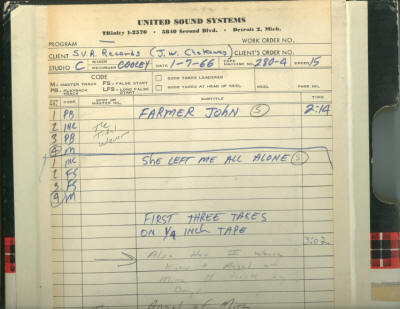 played
by members of the Detroit Symphony Orchestra. Paul Canon of WKNR broke the
record, giving it the Keener Key “Song Of The Week” for August 29, 1966. It
would peak at number 18 on WKNR the week of September 19. The b-side, “Big Boy
Pete” was another Harris-Terry penned song( they wrote “Farmer John“), recorded
in the same party-like atmosphere as “Farmer John”, replete with cryptic
comments like “Miss Kitty, Miss Kitty” and “John Bonner is cool, cool, man”. A
full page ad was placed in the music industry trade magazines the week of
September 24,1966. The ad also mentioned other HBR artists such as Positively
Thirteen O’clock.
played
by members of the Detroit Symphony Orchestra. Paul Canon of WKNR broke the
record, giving it the Keener Key “Song Of The Week” for August 29, 1966. It
would peak at number 18 on WKNR the week of September 19. The b-side, “Big Boy
Pete” was another Harris-Terry penned song( they wrote “Farmer John“), recorded
in the same party-like atmosphere as “Farmer John”, replete with cryptic
comments like “Miss Kitty, Miss Kitty” and “John Bonner is cool, cool, man”. A
full page ad was placed in the music industry trade magazines the week of
September 24,1966. The ad also mentioned other HBR artists such as Positively
Thirteen O’clock.
The third Tidal Waves single “Action(Speaks Louder Than Words“)/“Hot Stuff” was released in early 1967. Dennis Mills wrote “Action”. While this song is recognized by many garage band collectors as the finest of all The Tidal Waves’ recordings, “Action” did not even chart on WKNR and did not receive any full page ads in the music industry magazines. The most likely reason for this is that Hanna Barbara was getting out of the music business at this time and did not do the proper promotion necessary to make it a hit. The Tidal Waves were not enamored with the b-side, “Hot Stuff” as is evidenced by the sarcastic-tinged vocal ad lib in the recording by Jon, “this is a song”. Two versions of this song were produced, the other one was with the title “High Class”
The Tidal Waves popularity grew to such a degree that they opened for national touring bands such as The Animals and The Herman's Hermits at Olympia Stadium and the Dave Clark Five at the Ford Auditorium. The Tidal Waves also played some shows with The Unrelated Segments. As for TV appearances, The Tidal Waves played all of their recorded output at various times on Robin Seymour’s “Swingin’ Time” TV show. In fact if not for The Tidal Waves performance of “Action” on “Swingin’ Time“, the single probably would have gone completely unnoticed in Detroit. The next Tidal Waves’ single would be under a different name, The Gruve.
Tidal Waves Discography:
Farmer John/ She Left Me All Alone -SVR-P1007, then released as Hanna Barbera-482, recorded-1-7-66
I Don’t Need Love/Big Boy Pete-Hanna Barbera-501, recorded 8-3-66
Actions (Speak louder than words)/Hot Stuff Hanna Barbera-515, recorded 12-31-66(Action)/8-3-66(Hot Stuff)
She’s My Woman-Unreleased, recorded-8-3-66
The Lykes of
Us-Trenton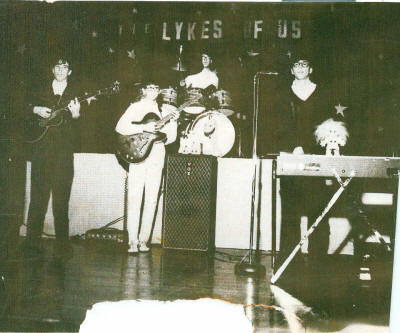
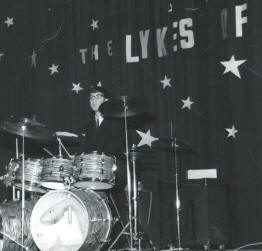
On February 4, 1968, The Lykes went to Dearborn to record a single, “7:30 Said” b/w “Tell Me Why Your Light Shines”. Five hundred copies of the record were pressed and released on the Molt record label. Molt stood for the initials of each band member’s last name. The records were sold by the band to family, friends, and classmates for a dollar each. In April, 1968, The Lykes played on Robin Seymour’s “Swingin’ Time” and lip-synched to “Tell Me Why Your Light Shines” while local High School students danced in front of the stage.
After the members of The Lykes graduated high school
in June, 1968, the band broke up. Commitments such as college, military service,
and full time jobs were the reasons for the split. .
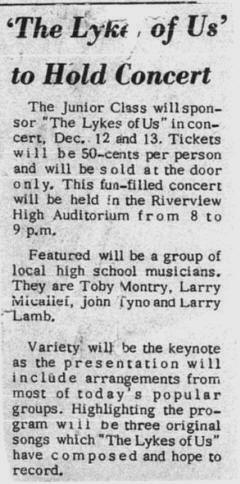
Discography:
7:30 Said/Tell Me Why Your Light Shines, Molt-6801, recorded
2-4-68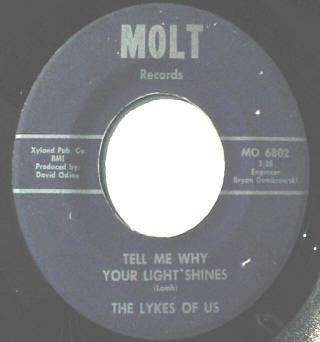
Unreleased recordings: October-1967 Rehearsal Tape:
7:30 Said, If I Needed Someone, I’m So Glad, Day Tripper, Ticket To Ride, Gimme Some Lovin‘, Mustang Sally, The Letter, Show Me, Heavy Music How Can I Be Sure
I’ll Sing You A Love Song-1969
LYRICS AND CHORDS FOR 7:30 SAID
SOMETIMES I THINK, AND GO
WONDERING WHY YOU OUGHT TO KNOW
7:30 SAID, 7:30 KNOWS, 7:30 GOES
THERE WAS A TIME, YOU WERE A FRIEND
PATIENT WAS I, THERE COULD BE NO END
,7:30 SAID, 7:30 KNOWS, 7:30 GOES
AFTER AWHILE, I MIGHT LOVE AGAIN
TIMES HAS ITS WAYS, BUT WE'LL KNOW THEN
WHO SHOULD IT BE
WHY CAN'T WE BE?
LIVE IN A DREAM
WHY DO YOU WALK AWAY FROM ME
IT MIGHT BE A BLESSING IN DISGUISE
IF YOU'D JUST LOVE ME ONCE AGAIN
RESTORE ALL TIES, 7:30 SA-AA-AID
The chords to "7:30 Said" are:(G) Sometimes I (F) think, and (Em) go (C) (D)
(G) Wondering (F) why you ought to (Em) know
(Em) 7:30 (C) said (F) 7:30 (G) knows, (Em)
7:30 (F) goes (Now the "F" chord the way Larry Lamb played it has the 3rd (G) string
open. It's a bit difficult to finger it that way, but I think it's absolutely
essential to the "vibe" of the song. The way I do it is my first finger on the
bottom 2 strings at the 1st fret; my 3rd finger on the4th (D) string at the 3rd
fret; and my thumb on the bottom (low-E) string at the 1st fret.)the part at the
end starts with a normal D-Minor chord, then you move down one fret on just the
B-string each successive bar. So the first bar is a normal D-Minor, the
second bar is Dm but you move your 3rd finger down one fret (toward the nut) on
the 2nd (B) string so you're playing a C-sharp instead of a D. The 3rd bar
you're playing an F-Chord, but with the 4th string open so it's sort of
like a Dm7th. The 4th bar you play the 2nd string open, so you're
fingering the E-string at the 1st fret and the G-String at the 2nd fret. (Dm)
Why do you (Dm-C#) walk away from (Dm-F) me (Dm-open)(Gm) It might be a message in dis- (A7) -guise
(Dm) If you'd just (Dm-C#) love me once a- (Dm-F) -gain (Dm-open) (Gm) Restore our ties 7:30 (Em) said (A) -ed (C)-ed (G)
The District Six-Dearborn Heights
Members were- Jim McCarthy-12 String guitar-vocals , Rick Barwinsky-Farfisa organ, Bill Scott-Hoffner bass/vocals, Phil Bradley-Lead guitar-Gibson Star-Burst 1958, Rick Lober-Ludwig drums.
The District Six had a tight garage sound as is evidenced by their cover version of Love‘s “7 And 7 Is” and “East Side Story”( a big local hit for Bob Seger in 1966). They also enjoyed doing harmonies and ballads and recorded three songs that were done by the famous hit group, The Association. One of them, the introspective song, “Remember”, from The Association’s “And Then….Along Comes The Association” album is also included on this compilation and shows another dimension to the District Six‘s sound. The band also recorded an original song entitled “Time Is The Beneficial Factor” at United Sound.
Discography: All recordings unreleased
More, 7 And 7 Is, Remember, Pandora’s Golden Heebee Geebies, Cherish, Talk Talk, Everybody Needs Somebody To Love, East Side Story, Turn On Your Love Light, Respect, Come On Up, Show Me- All tracks recorded-12-1966
Time Is The Beneficial Factor-recorded at United Sound
The Couriers
Little is know of this band, except for the
recordings of these two classic tracks in 1967. Mixed in stereo, “I Couldn‘t
Care Less” was also done by another Michigan garage band, The
Run-A-Rounds(East Detroit) and issued on the
Manel label, with slightly altered lyrics.
Discography:
I Couldn’t Care Less/Just Tell Me-Unreleased, recorded-1967
The Unrelated Segments-Taylor, Lincoln Park, Allen Park, Melvindale
Ron Stults (lead vocals)-Taylor, Rory Mack (lead guitar)-Taylor, Barry Van Engelen (bass)-Lincoln Park, Andy Angellotti (drums)-Melvindale, John Torock-(rhythm guitar) Allen Park
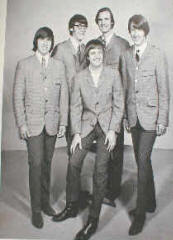 When the lead singer for The Unrelated Segments, Ron Stults, was growing up in
the fifties he was impressed by Elvis and Ricky Nelson’s hits. Ron developed his
vocal style while singing along with their songs on the radio. In 1963, while
barely in high school, he formed a group called The High Tones. The band
recorded three songs that were cut to acetates, but are now missing in action.
The group became popular around Michigan and opened for national bands such as
The Four Seasons. In late 1963, The High Tones changed their instrumental style
after listening to a Beatles’ album issued in Canada. This was a few months
before The Beatles were known in America. The High Tones lasted till the early
1965, when one of the members was drafted into the Navy.
When the lead singer for The Unrelated Segments, Ron Stults, was growing up in
the fifties he was impressed by Elvis and Ricky Nelson’s hits. Ron developed his
vocal style while singing along with their songs on the radio. In 1963, while
barely in high school, he formed a group called The High Tones. The band
recorded three songs that were cut to acetates, but are now missing in action.
The group became popular around Michigan and opened for national bands such as
The Four Seasons. In late 1963, The High Tones changed their instrumental style
after listening to a Beatles’ album issued in Canada. This was a few months
before The Beatles were known in America. The High Tones lasted till the early
1965, when one of the members was drafted into the Navy.
Ron then joined The Village Beaus(who also played on the same bill as The Lykes Of Us). Rory Mack, a classmate of Ron, was also in the group. The band played lots of Beatles, Stones, and Them songs. Internal conflicts led to the break up of the group by September of 1966 and nothing was ever recorded. About two and a half months later Rory got hold of Ron because he was forming a new group with John Torock and they needed a lead singer. Ron joined up with the as yet unnamed group. John Torock was the oldest member of the group (all the other members were still in high school) and was going to business college, taking a course in micro-economics. There was some theory about unrelated segments in his class and thus was born the name of the new group. John's father Louis was very helpful to the band and allowed them to use the Torock basement and garage for rehearsals. Louis would also become the group's official manager.
It was in Torocks’ basement that three of The Unrelated Segments’ songs were written, "Story Of My Life", "Where You Gonna Go", and "Its Unfair". In fact The Segments had only been together for two practices when "Story Of My Life" was written. "It’s Unfair" was put together at the next days practice. Torock was so excited about the bands productive output that he wanted Checkaway of SVR Records to hear their songs. Torok knew Jack since his son, John, had played with another SVR band, The Tidal Waves, when a group member was injured. When Checkaway heard The Segments he was so impressed he booked them into United Sound Studio. The first single "The Story Of My Life" b/w "It’s Unfair" was recorded on November 26, 1966 in three and a half hours. Afterwards, the band packed up their instruments and played a show a few hours later at a high school in Lincoln Park.
"Story Of My Life" and "It’s Unfair" was released in
February of 1967. Ron says that the meaning behind "The Story Of My Life" is
about how when love is lost
and disillusion sets in. As with all The Unrelated Segments songs Ron wrote the
lyrics and Rory the music. It was played heavily around the Detroit area ,
entering the WKNR top 31 on February 27, 1967 at no. 29 and went all the way to
#9 on WKNR on their April 3, 1967 top 31 survey. It was also at #15 on their
"All Time Top 113" list published in 1969. In Ohio, it was a smash hit and went
to #3 at WTOD in Toledo. Checkaway told Torock the week the song was to be
played on the radio but did not know exactly when it would be played. One day
Ron and Rory are getting into Ron's car. Ron had just turned on the ignition and
started to play the radio when all of a sudden "The Story Of My Life" came on
the airwaves of WKNR. Ron recalls "It’s a weird feeling when you first hear it,
you say to yourself that I wish I could have done it this way or mixed it
another way". The single earned The Unrelated Segments more gigs and some fan
clubs in Wayne and Lincoln Park, Michigan. The fan clubs would come out and
support the band. Newsletters were printed with the latest information about the
band. WKNR in 1967 ran a contest for Michigan's best band. The Segments beat
out everyone including Bob Seger’s group, but lost to The Rationals.
In the first week in June of 1967, The Unrelated Segment went to United Sound
Studio to record "Where You Gonna Go", "It’s Gonna Rain" and "Cry, Cry, Cry"
during a six hour session. Ron says "Where You Gonna Go" is about “when
everyone is going through the paces and the same thing is happening as the day
before and nothing is ever getting done.” Ron continues “It’s Gonna Rain" is
about the identical theme as "Where You Gonna Go", alienation, and that people
try to cling onto ideas or aspirations, but come to the realization that all
they hoped for just isn't coming to fruition.” "Where You Gonna Go" b/w "Its
Gonna Rain" was released in the second week of September and entered the WKNR
charts at No. 28 the week of September 11, 1967. It would peak at #14 on WKNR.
A full page ad was placed in Cash Box Magazine the week of October 21 and then
the following week the same ad was placed in Billboard. Why did such a fine
single fail to chart higher? Ron says “it was due to sheer bad timing. The
racial riots in Detroit also occurred in September of 1967 and as the single was
moving up the charts, the riots shut down the whole city and caused slack
sales.”
While many groups from the era were content to do cover songs for their live shows, The Segments performed mainly original songs that were unfortunately never recorded. One song, “Chocolate Graveyard”, has attained mythical status among Unrelated Segment fans as existing, but the song was never recorded because Checkaway was afraid of the potential for racial overtones. Ron says it was “a psychedelic song with a psychedelic title, influenced by bands with such names as The Strawberry Alarm Clock.” A couple of other problematic songs were "It’s All Right Mr. White" which was about the social upheavals in the 60's and again was not meant to have any racial overtones and "War In Vietnam", a protest song, very popular with the Segments’ audience. Another unreleased war protest song was "Mr. Christopher”. It was about a man who was misused by the establishment and written in November of 1968
The Unrelated Segments played The Grande Ballroom and
other venues with major touring groups such as Fever Tree, Spirit, Spencer Davis
Group, and The Jeff Beck Group. The Unrelated Segments also played with
legendary Michigan groups such as The Amboy Dukes, SRC, Dick Wagner and The
Frost and The MC5. The MC5 show was at Oakland Community College after they had
their first album released. Ron already knew Wayne Kramer when he was in The
Nomads in 1965. One of the most memorable Unrelated Segment shows was at
Southfield High School in 1968. The Amboy Dukes opened the show, followed by The
Unrelated Segments and then The Who. There were about 4,000 students in the
auditorium. The Segments also performed on TV. They played on "Upbeat"
lip-synching "Where You Gonna Go" and "The Story Of My Life". Also on that show
was Lesley Gore, The Human Beinz, and Peaches and Herb. On Robin Seymours’
“Swingin’ Time” show The Unrelated Segments performed ten different times! 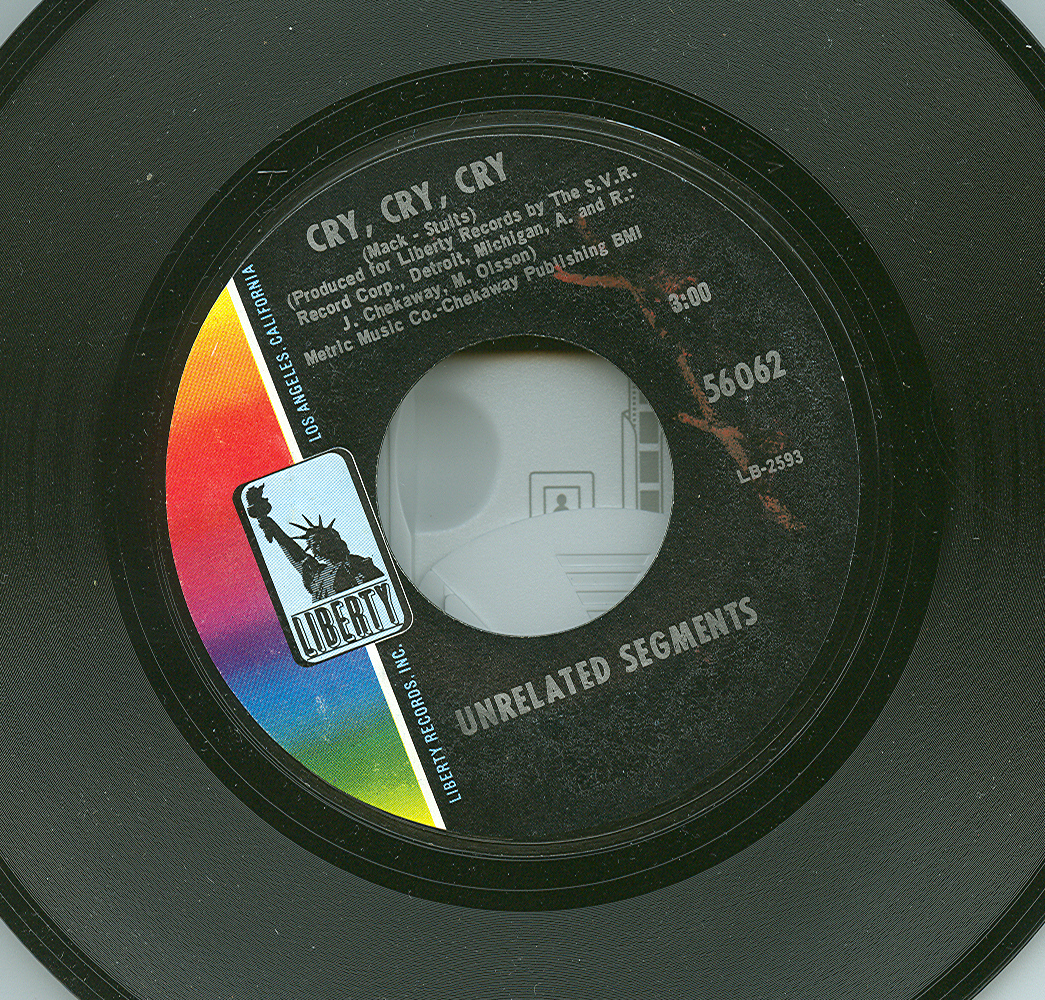
The Unrelated Segments last single was "Cry, Cry, Cry" b/w "It’s Unfair"(It’s Not Fair). “It’s Unfair” was the same version that was released as the b-side to the first single, “The Story Of My Life”. “Cry, Cry, Cry” though, was recorded at the same session as "Where You Gonna Go" and "Its Gonna Rain" in June of 1967, but not released until the summer of 1968. "Cry, Cry, Cry" only charted at #30 on WTAC in Flint and did not even chart on WKNR. The themes of "Cry, Cry, Cry" were, disillusionment, love gone bad, blind justice, and turmoil. Shortly after "Cry, Cry, Cry" was released Andy was fired from the band over differences with Torock and the band’s chemistry was altered dramatically. The next drastic change was when Barry got drafted six month later and went to Vietnam. John who originally played rhythm guitar switched over to bass guitar. Daryl Gore took over for two months as rhythm guitar, but then left for California. The Unrelated Segments changed their name to simply U.S. at the end of 1968 and had a new manager, Leo Finn.
On January 1, 1969, U.S. recorded a song written by Ron and Rory titled "Hey Love". It was also produced by the band and recorded at GM Recording Studios in East Detroit. A couple of months after this recording Rory decided he was leaving the music business for good and was replaced by Craig Webb on lead guitar. The next song by U.S. was written by Ron and Craig entitled "There's Gonna Be A Change". It was recorded in March of 1969. The personnel changes in the band though, had a permanent fracturing effect and before 1969 ended US dissolved. Fragments of the group went on to form “Lost Nation” and record a Lp for Motown.
Discography:
The Story Of My Life/It’s Not Fair-Hanna Barbera-514, recorded-11-26-66
Where You Gonna Go?/It’s Gonna Rain-Liberty-55992, recorded -6-7-67
Cry, Cry, Cry/It’s Unfair-Liberty-56062, recorded-6-7-67
Hey Love, recorded-1-1-69-unreleased)
There’s Gonna Be A Change, recorded-3-69-unreleased Help Induct The Unrelated Segments and Tidal Waves Into The Michigan Rock and Roll Hall Of Fame For 2009!!!!
Gruve-(aka The Tidal Waves)
The last two recordings by The Tidal Waves were done under a different group moniker, The Gruve. The reason for the name change was that The Tidal Waves wanted a hipper sounding name more in tune with the 1967 vibes of Hippies and Flower-Power. The band thought that The Tidal Waves was a dated surf band moniker. By the time they changed their name to The Gruve, three Tidal Waves had left the group, Tom and Jon Wearing and Dennis Mills. The Gruve consisted of, Bill Long on lead guitar, Rick Jackson on bass guitar, Jerry Czernell on keyboards, and Lenny Melkus on drums. Rick wrote “You’re Gonna Love Me” which was left as just a rhythm track. The Gruve had great harmonies and lead vocals worked out for the track, but for some unknown reason they were never called in to finish the song. The people from Liberty records were so impressed with the sound they asked Checkaway if the track was recorded at the new Abby Road studios in London! The Gruve covered the Issac Hayes song “Said I Wasn’t Gonna Tell Nobody” because they heard The Rationals play it live at The Hide Out (which was run by Punch Anderson Bob Seger's manager). The single did not chart high regionally, as Liberty Records was on the verge of going out of business and did not promote it. The Gruve broke up shortly thereafter with just this one single and unreleased track to their credit.
Discography:
You’re Gonna Love Me/ Said I Wasn’t Gonna Tell Nobody-Liberty-56034, recorded-12-28-67
Take Hi-Five(unreleased)recorded-12-28-67